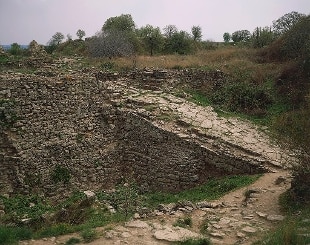- New excavation brings back the heart of ancient Troy: here the destruction narrated by Homer took place
- But which horse: that of Troy was actually a ship
- Idyssey, from Troy to Ithaca with two iPhones: Stefano De Luigi's work
Share
01 July 2020From the last excavations on the hill of Hissarlik, in Turkey, a hypothesis becomes certainty: in Troy it was not two different populations that clashed, much more simply it was a 'civil war'. The Achaeans from Greece fought against the Achaeans who had already settled in the city. One of the greatest scholars of the Aegean civilizations, Professor Louis Godart, supports it in an article that comes out in the new issue of the magazine "Archeologia Viva" (Giunti Editore)."Greeks and Trojans spoke the same language, had the same beliefs, same customs and habits, the same type of armament. Homer says it clearly in his Iliad. Today confirmation comes from archeology which helps to rewrite an entire page of history, decidedly the best known and most popular ": the discovery summarizes the historian and archaeologist Louis Godart, who taught Aegean Civilization at the 'Federico II' University of Naples and was a councilor for the conservation of the artistic heritage at the Presidency of the Italian Republic and he is a member of the Accademia dei Lincei, the Institut de France and the Academy of Athens.
"The research conducted in Troy by the archaeological mission of the German University of Tübingen combined with a reflection on the study of the texts of the linear B tablets written in the Achaean dialect of the Mycenaean Greeks - declares Godart - radically change our perspectives on the history of northern Anatolia - western and Aegean at the end of the second millennium, in particular between 1200 and 1180 BC ".
The so-called Troy VII dates back to this period (according to the numbers that archaeologists have given to the various strata of the long life of the city), at that time the most important city of Anatolia and the Near East, where people took refuge in the inside the walls by placing large vessels in the soil for the storage of foodstuffs (discovered by archaeologists) in order to support the long siege which then ended with the fall of the city, as the human remains and traces of the fighting found in the stratum suggest of destruction of the settlement.
Achaeans and Trojans, two faces of the same people. In Homer Achaeans and Trojans are never clearly differentiated. According to the Iliad, the two peoples prayed to the same gods, to whom they paid the same sacrifices. They spoke the same language and the Trojans had Greek names.
There are never any communication problems between Achaeans and Trojans and even the name Ettore was not a barbaric name for the Greeks, Godart always explains.
There was a cult of Hector in Thebes; in Thassos, an island near the Thracian coast, a division of the city bore the name of Priamides.
In a series of tablets in linear B (the writing of the Mycenaeans) by Pilo, the anthroponym 'e-ko-to' has been identified which corresponds to the Greek 'Hector', while in another text always found in Nestor's palace, there was the patronymic 'e-ko-to-ri-jo', 'Hectorio's,' son of Hector '.
"The name Ettore is therefore an Achaean name, even if in the Iliad it indicates the great Trojan champion - Godart always illustrates - Since the names of the Trojan heroes are Greek, Homer, making the Achaeans and the Trojans speak the same language, does nothing else than to reflect the situation that prevailed on the Acropolis of Troy at the end of the thirteenth century BC ".
"I would be absolutely inclined, as I argue in my article on 'Archeologia Viva' and in my book 'Da Minosse a Omero' (Einaudi) - explains Godart - to believe that it was a Mycenaean aristocracy who commanded Troy in phase VIi which inspired Homer.
The abundant Mycenaean pottery found on the site of Troy in the strata of the 13th century BC undoubtedly comforts such a hypothesis. If this is indeed the case and if Priam was an Achaean king, we should believe that the Trojan war sung by Homer was a war. civilization in which the Achaeans of the continent, islands and Crete relentlessly opposed other Achaeans ".
Louis Godart is the author of important publications at Einaudi: "The Phaistos Disc. The enigma of writing", "The invention of writing", "The gold of Troy. The true story of the treasure discovered by Schliemann" (with Gianni Cervetti), and the recent "From Minos to Homer. Genesis of the first European civilization".

